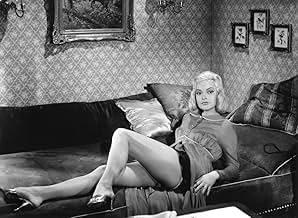"Das Mädchen Rosemarie" offers a compelling tale of a West German call girl
caught up in the big money world of capitalism in the 50's. The title character is a resourceful, intelligent beauty who attempts to outwit morally corrupt
businessmen, and fails, losing her life. From the opening sequence which finds Rosemarie dancing below a hotel, "Das Mådchen" is full of vibrancy and life, containing an almost lyrical quality to the film. Singing is prevalent throughout the film, with Rosemarie's lowly
aquaintances providing social commentary with an accordion throughout the
movie. Along with this poetic quality, the film also finds strength through its stylish camera work. Full of extreme zooms and close-ups, the camera adds
real drama and a sense of urgency to the story. Nadja Tiller, as the call-girl Rosemarie, is electrifying, dominating the screen in every scene. Beautiful and resourceful, you never doubt her ability to outwit the West German
businessmen. The supporting cast is also very strong. As for weaknesses of the movie, the story does tend to drag along a bit, despite the music which is prevalent throughout. The main problem however,
is its hit you over the head method of displaying its message. The audience is constantly bombarded with messages of the ills of capitalism , most commonly displayed through the songs of Rosemaries friends , which are not-so-subtle
jabs at capitalism. While the merits of capitalism are certainly valid film topics, the constant barrage detracts from the movie. The story works on its own, and does not need the constant anti-capitalist messages. Stylistically, "Das Mådchen has echos of Hitchcock, with its dizzying camera work and morbid end. Despite this one major flaw, "Das Mådchen" is a colorful and enjoyable movie, complete with a tragic ending which lends an air of seriousness to the movie.
































